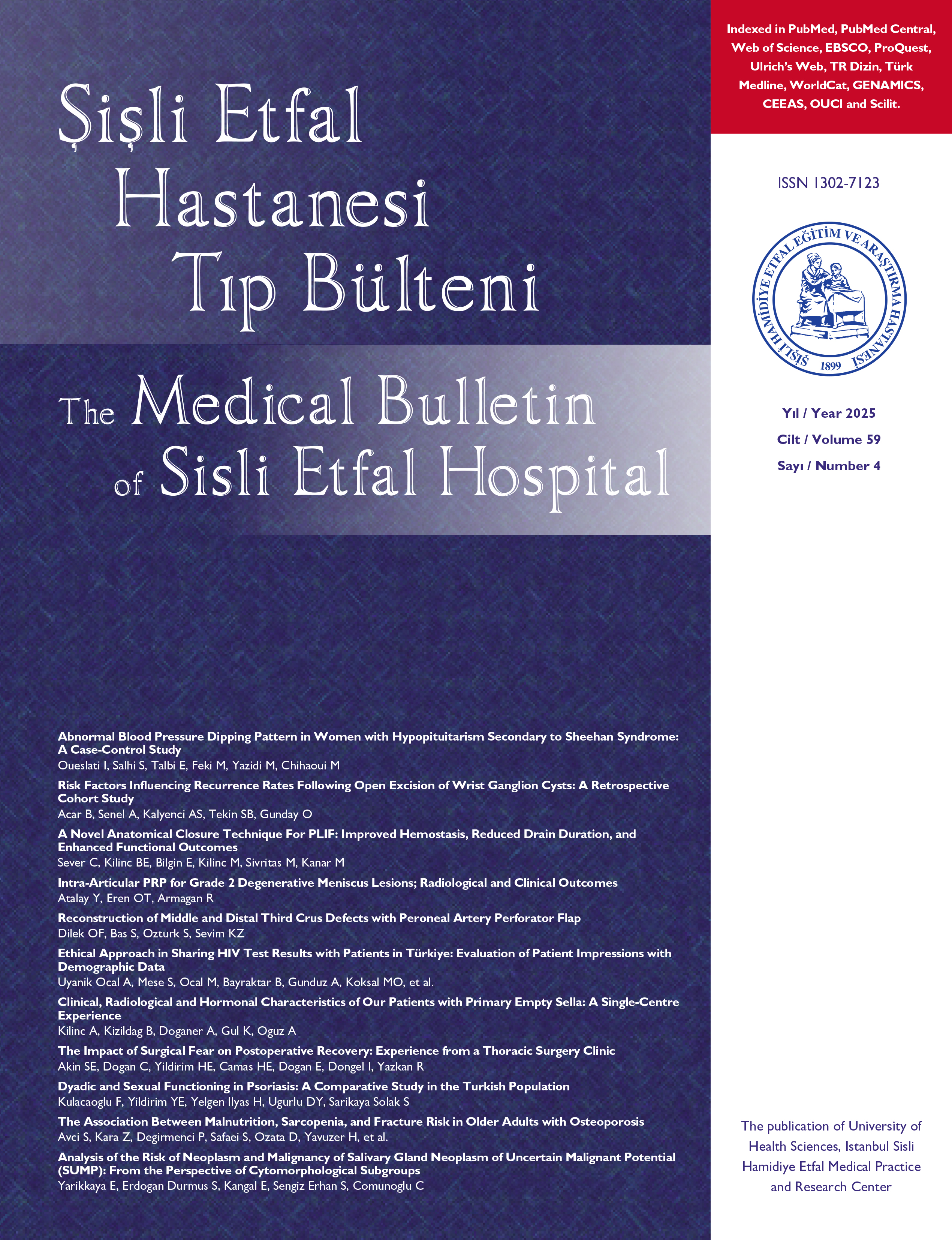
The effect of High-Dose Vitamin C Treatment for Acute Respiratory Failure Due to Coronavirus Disease Pneumonia on Mortality and Length of Intensive Care Stay: A Retrospective Cohort Study
Nurcan Coskun, Mustafa Altinay, Hacer Sebnem Turk, Nebia Peker, Serkan Islamoglu, Ayse Surhan Cinar, Melis Turkel OzkanDepartment of Anesthesiology and Reanimation, University of Health Sciences Türkiye, Sisli Hamidiye Etfal Training and Research Hospital, Istanbul, TürkiyeObjectives: In our study, we aimed to determine the effect of vitamin C on short-term mortality and length of intensive care unit (ICU) stay in patients with coronavirus disease (COVID-19) followed up in the ICU.
Methods: The patients who received and those who did not receive the high-dose intravenous vitamin C protocol were assigned to the treatment and control groups, respectively. The primary study findings in both groups were length of ICU stay and shortterm mortality, while the secondary findings were vasopressor and invasive mechanical ventilation requirements and change in sequential organ failure assessment score from the 0 to the 96th hour.
Results: Thirty-eight patients were included in the treatment group and 40 were included in the control group. The mortality rates were 44% and 60% in the treatment and control groups, respectively; however, the difference between the groups was not statistically significant (p>0.05). The median length of ICU stay in both groups was 10 days (p>0.05). No significant differences in the invasive mechanical ventilation and vasopressor requirements were found between the groups (p>0.05).
Conclusion: Consequently, the high-dose vitamin C therapy in the patients with acute respiratory failure due to COVID-19 pneumonia did not reduce the length of ICU stay, mortality, and invasive mechanical ventilation and vasopressor reqirements.
Keywords: Ascorbic acid, coronavirus disease, intensive care, respiratory distress syndrome, sepsis
Koroavirüs Hastalığı Pnömonisine Bağlı Akut Solunum Yetmezliğinde Yüksek Doz C Vitamini Tedavisinin Mortalite ve Yoğun Bakımda Kalış Süresine Etkisi: Retrospektif Kohort Çalışması
Nurcan Coskun, Mustafa Altinay, Hacer Sebnem Turk, Nebia Peker, Serkan Islamoglu, Ayse Surhan Cinar, Melis Turkel OzkanTürkiye Sağlık Bilimleri Üniversitesi, Şişli Hamidiye Etfal Eğitim ve Araştırma Hastanesi, Anesteziyoloji ve Reanimasyon Anabilim Dalı, İstanbulAmaç: Çalışmamızda yoğun bakım ünitesinde (YBÜ) takip edilen koronavirüs hastalığı (COVID-19) hastalarında C vitamininin kısa dönem mortalite ve yoğun bakım ünitesinde kalış süresine etkisini belirlemeyi amaçladık.
Metod: Yüksek doz intravenöz C vitamini protokolü alan ve almayan hastalar sırasıyla tedavi ve kontrol gruplarına ayrıldı. Her iki grupta da birincil çalışma bulguları YBÜ kalış süresi ve kısa dönem mortalite iken, ikincil bulgular vazopresör ve invaziv mekanik ventilasyon gereksinimleri ve Sequential Organ Failure Assessment Skorunun 0'dan 96. saate değişimi idi.
Bulgular: Tedavi grubuna 38, kontrol grubuna 40 hasta dahil edildi. Tedavi ve kontrol gruplarında mortalite oranları sırasıyla %44 ve %60 idi; ancak gruplar arasındaki fark istatistiksel olarak anlamlı değildi (p<0.05). Her iki grupta da median yoğun bakım kalış süresi 10 gündü (p<0.05). Gruplar arasında invaziv mekanik ventilasyon ve vazopresör gereksinimlerinde anlamlı fark bulunmadı (p<0.05).
Sonuç: Sonuç olarak, COVID-19 pnömonisine bağlı akut solunum yetmezliği olan hastalarda yüksek doz C vitamini tedavisi, yoğun bakımda kalış süresini, mortaliteyi, invaziv mekanik ventilasyon ve vazopresör gereksinimlerini azaltmadı. (SETB-2022-11-244)
Anahtar Kelimeler: Askorbik Asit, Koronavirüs Hastalığı, Yoğun Bakım, Solunum Yetmezliği Sendromu; Sepsis
Manuscript Language: English



















